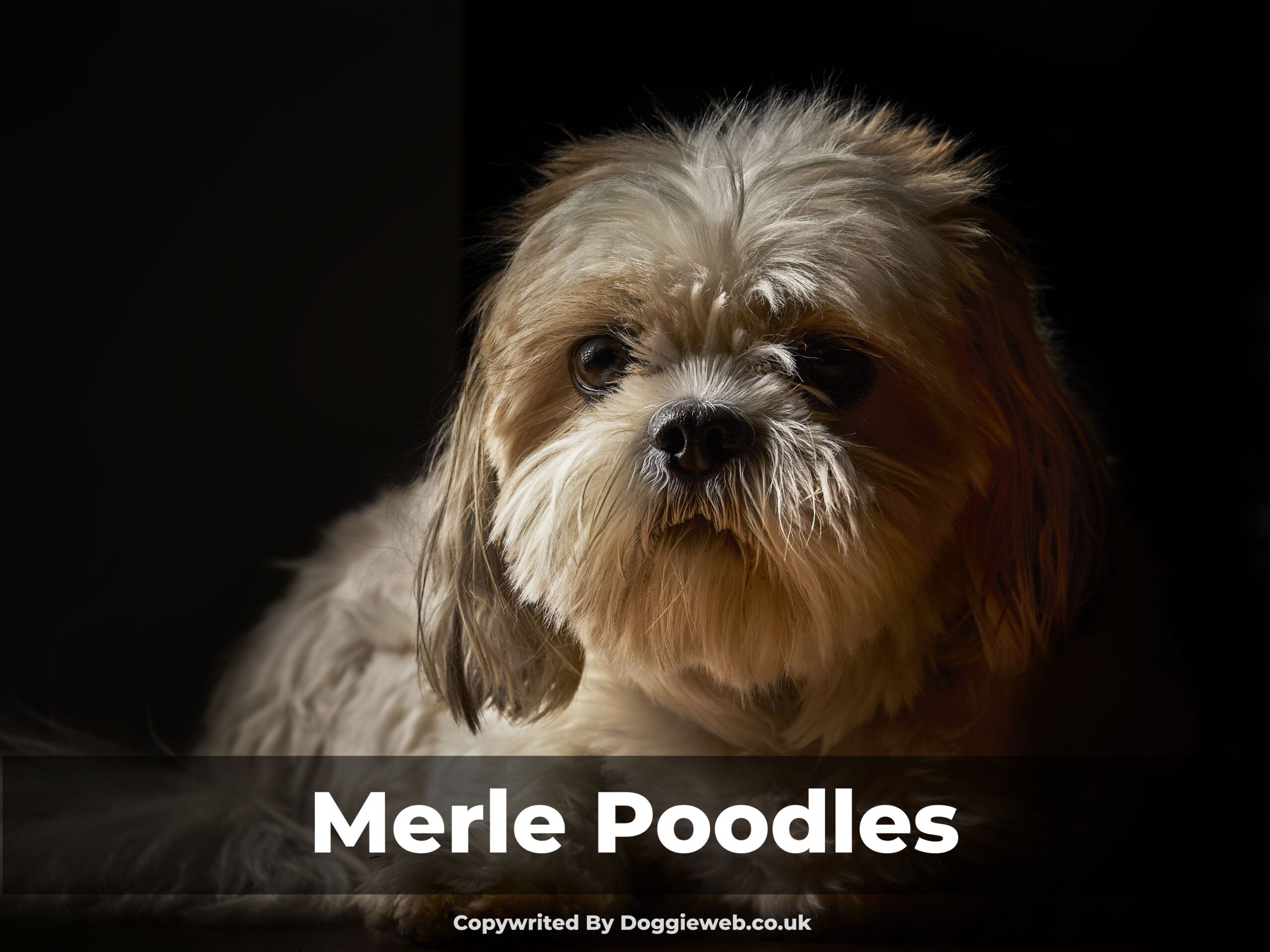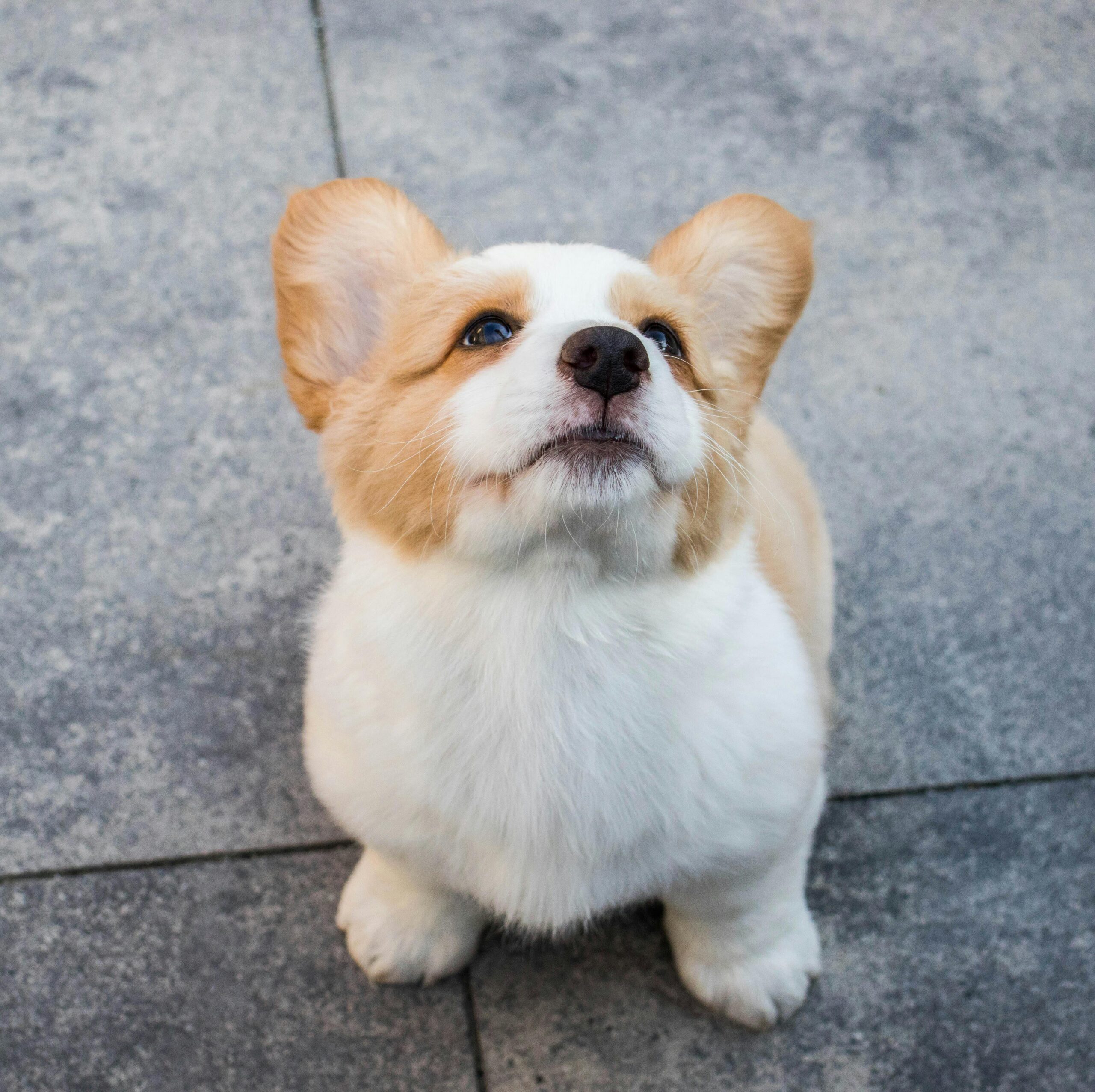
Poodles are renowned for their intelligence, elegance, and versatility. Among the various types of Poodles, the Merle Poodle stands out for its unique and eye-catching coat pattern. This article delves into the fascinating world of Merle Poodles, exploring their history, characteristics, care needs, and more.
Table of Contents
Introduction
Merle Poodles are a variation of the standard, miniature, or toy Poodle that possesses a distinct coat pattern known as “merle.” This pattern features patches of color blended with a lighter shade, giving the coat a mottled or speckled appearance. Merle Poodles are not only visually stunning but also possess the same lovable traits that make Poodles a popular choice among dog enthusiasts.
Understanding the specifics of Merle Poodles is crucial for potential owners, breeders, and dog lovers. This knowledge ensures proper care, responsible breeding practices, and an appreciation for the unique qualities of these dogs. Additionally, awareness of the genetic factors and health considerations associated with Merle Poodles can help in making informed decisions about their care and maintenance.
History and Origin of Poodles
Poodles have a rich history that dates back several centuries. Originally bred in Germany as water retrievers, Poodles were prized for their exceptional swimming abilities and intelligence. Their name is derived from the German word “Pudel,” meaning “to splash in water.” Over time, Poodles gained popularity in France, where they became the national dog and were further refined into the elegant and sophisticated breed we recognize today.
The evolution of Poodles saw the development of three distinct sizes: standard, miniature, and toy. Each size variation served different purposes, from hunting and retrieving to companionship and performance in circuses. The breed’s versatility, intelligence, and hypoallergenic coat contributed to its widespread appeal across different countries and cultures.
The Merle gene, responsible for the unique coat pattern seen in Merle Poodles, was introduced through crossbreeding with other merle-patterned breeds. This gene causes a dilution of the base coat color, resulting in patches of lighter color intermixed with the original shade. While the Merle pattern is a striking and desirable trait, it also requires careful consideration due to potential health implications.
What is a Merle Coat Pattern?
The Merle coat pattern is characterized by a mottled or speckled appearance, where patches of the base coat color are diluted to a lighter shade. This creates a unique and visually appealing pattern that can vary greatly in terms of color distribution and intensity. Merle can appear in various colors, including blue, red, and chocolate, adding to the diversity and charm of Merle Poodles.
The Merle pattern is controlled by a specific gene known as the “M” gene. When a dog inherits one copy of the Merle gene (Mm), it typically displays the merle pattern. However, when a dog inherits two copies of the Merle gene (MM), it can result in health issues such as deafness and vision problems. Therefore, responsible breeding practices are essential to avoid these complications and ensure the well-being of Merle Poodles.
Merle Poodles: An Overview
Merle Poodles boast a stunning appearance that sets them apart from their solid-colored counterparts. Their coats can feature a wide range of colors and patterns, with each Merle Poodle being uniquely marked. In addition to their distinctive coats, Merle Poodles exhibit the same elegant and graceful build as other Poodles, with a proud stance, expressive eyes, and a curly or wavy coat.
Like other Poodles, Merle Poodles come in three sizes: standard, miniature, and toy. Standard Merle Poodles are the largest, standing over 15 inches tall at the shoulder and weighing between 40 to 70 pounds. Miniature Merle Poodles are smaller, standing between 10 to 15 inches tall and weighing 10 to 15 pounds. Toy Merle Poodles are the smallest, standing under 10 inches tall and weighing between 4 to 6 pounds. Each size variation has its own charm and appeals to different lifestyles and preferences.
Merle Poodles are known for their friendly, intelligent, and loyal nature. They are highly trainable and thrive on mental stimulation and physical activity. Their playful and affectionate demeanor makes them excellent companions for families, singles, and seniors alike. Merle Poodles are also known for their adaptability, making them suitable for various living environments, from apartments to spacious homes with yards.
Health Considerations for Merle Poodle

While Merle Poodles are generally healthy dogs, they can be prone to certain health issues, especially if bred irresponsibly. Common health concerns include hip dysplasia, progressive retinal atrophy (PRA), epilepsy, and allergies. The presence of the Merle gene also introduces potential risks such as deafness and vision problems, particularly in double merle (MM) dogs.
To ensure the health and well-being of Merle Poodles, genetic testing and screening are crucial. Prospective owners and breeders should prioritize health screenings for common genetic conditions and the presence of the Merle gene. Responsible breeders will conduct these tests and provide documentation to guarantee the health of their puppies.
Regular veterinary check-ups, a balanced diet, and appropriate exercise are essential for maintaining the health of Merle Poodles. Additionally, proper grooming and coat care can prevent skin issues and keep their coats in optimal condition. Owners should also be vigilant about dental care, vaccinations, and parasite prevention to ensure their Merle Poodles live long, healthy lives.
Caring for a Merle Poodle
A well-balanced diet is vital for the overall health and longevity of Merle Poodle. High-quality dog food that meets their nutritional needs is essential. Depending on their size and activity level, Merle Poodles may require different caloric intake and dietary considerations. Consulting with a veterinarian can help determine the best diet plan tailored to your Merle Poodle’s specific needs.
Merle Poodles are active and energetic dogs that require regular exercise to stay healthy and happy. Daily walks, playtime, and mental stimulation are crucial for their well-being. Engaging in activities such as fetch, agility training, and puzzle toys can help keep them physically and mentally stimulated. Exercise not only maintains their physical health but also prevents behavioral issues caused by boredom and excess energy.
Regular grooming is essential for maintaining the beautiful coat of Merle Poodle. Their curly or wavy fur requires frequent brushing to prevent matting and tangling. Professional grooming every 4 to 6 weeks is recommended to keep their coat in optimal condition. Additionally, regular bathing, nail trimming, ear cleaning, and dental care are crucial components of their grooming routine. Maintaining proper grooming not only enhances their appearance but also promotes overall health and comfort.
Training Merle Poodle
Training Merle Poodles is a rewarding experience due to their intelligence and eagerness to learn. Start with basic commands such as sit, stay, come, and heel. Positive reinforcement techniques, including treats, praise, and play, are highly effective in motivating them. Consistency, patience, and short, focused training sessions can yield the best results.
Socialization is vital for Merle Poodles to develop into well-rounded and confident dogs. Expose them to various environments, people, and other animals from a young age. Puppy classes, playdates, and regular outings can help them become comfortable and well-behaved in different situations. Proper socialization reduces the likelihood of behavioral issues and promotes positive interactions.
Merle Poodles excel in advanced training and can master a variety of tricks and commands. Agility training, obedience competitions, and advanced trick training can provide mental stimulation and physical exercise. Teaching them complex tricks, such as rolling over, playing dead, and retrieving specific objects, can be enjoyable for both the dog and the owner, strengthening the bond between them.
Living with a Merle Poodle
Merle Poodle adapt well to various living conditions, whether in an apartment or a house with a yard. They thrive in environments where they receive ample attention, exercise, and mental stimulation. While they are adaptable, they do best in homes where they are considered part of the family and included in daily activities.
Merle Poodle are known for their friendly and sociable nature, making them excellent companions for families with children and other pets. They are gentle and patient with kids and can coexist harmoniously with other dogs and cats when properly introduced. Supervised interactions and early socialization can ensure positive relationships with other household pets.
While Merle Poodle are generally well-behaved, they can develop behavioral issues if not properly trained and stimulated. Common problems include separation anxiety, excessive barking, and destructive chewing. Addressing these issues through training, exercise, and mental stimulation can help manage and prevent unwanted behaviors. Seeking the help of a professional dog trainer or behaviorist may be beneficial for more complex issues.
Merle Poodles in Competitions and Shows
Merle Poodles are eligible to participate in various dog shows and competitions, showcasing their beauty, intelligence, and agility. These events provide an excellent platform for Merle Poodles to demonstrate their skills and compete against other top-tier dogs. Participation in dog shows requires training, grooming, and adherence to specific breed standards.
While Merle Poodle may not be recognized by all kennel clubs due to the unique nature of their coat pattern, they can still compete in certain categories and events. It is essential to check the specific regulations and guidelines of the kennel club or organization hosting the competition. Merle Poodles can gain recognition and accolades through performance-based events and specialty shows.
Merle Poodle have achieved notable success in various competitions and shows, earning titles and awards for their performance and appearance. Their intelligence, agility, and striking looks make them strong contenders in obedience trials, agility competitions, and conformation shows. Celebrating their achievements highlights the breed’s versatility and excellence.
Breeding Merle Poodles

Ethical breeding practices are crucial to ensure the health and well-being of Merle Poodles. Responsible breeders prioritize the health, temperament, and genetic diversity of their breeding stock. Avoiding breeding two Merle Poodles together (to prevent the risks associated with double merle genetics) and conducting health screenings are essential steps in ethical breeding.
Breeding Merle Poodle presents unique challenges, primarily due to the genetic considerations associated with the Merle gene. Ensuring that breeding pairs do not both carry the Merle gene is vital to avoid producing double merle puppies with potential health issues. Breeders must also be knowledgeable about the genetics and health testing necessary to produce healthy and well-adjusted puppies.
Finding a reputable breeder is essential for acquiring a healthy and well-bred Merle Poodle. Prospective owners should research breeders thoroughly, asking for health clearances, pedigrees, and references. Visiting the breeder’s facility, meeting the parent dogs, and asking questions about breeding practices can help ensure that the breeder prioritizes the health and well-being of their dogs.
Myths and Misconceptions About Merle Poodles
There are several myths and misconceptions surrounding Merle Poodles. One common myth is that Merle Poodle are less healthy than their solid-colored counterparts. While the Merle gene can introduce certain health risks, responsible breeding and proper care can ensure that Merle Poodles are healthy and robust. Another myth is that Merle Poodles are a separate breed, when in fact, they are simply Poodles with a unique coat pattern.
Misunderstandings about Merle genetics often lead to misconceptions about the breed. Some people believe that Merle Poodles are more prone to behavioral issues or that their coat pattern affects their temperament. In reality, the Merle gene primarily influences coat color and pattern, and with proper breeding and care, Merle Poodles can be just as healthy and well-behaved as any other Poodle.
Adopting a Merle Poodle
Adopting a Merle Poodle from a rescue or shelter can be a rewarding experience, providing a loving home to a dog in need. Adoption is often more affordable than purchasing from a breeder and supports the mission of animal rescue organizations. However, prospective owners should be prepared for the possibility of adopting a dog with an unknown history and potential behavioral or health challenges.
When adopting a Merle Poodle, it’s essential to choose a reputable rescue or shelter. Look for organizations that provide thorough health and behavior assessments, offer support and resources for new owners, and have a transparent adoption process. Visiting the facility, meeting the dog, and asking questions about their background and care can help ensure a successful adoption.
The adoption process typically involves completing an application, undergoing a home visit or interview, and paying an adoption fee. Some rescues and shelters may also require references and a commitment to follow-up visits or training classes. The goal is to match the dog with a suitable and loving home, ensuring a positive experience for both the dog and the owner.
Merle Poodles and Families
Merle Poodles are known for their gentle and patient nature, making them excellent companions for children. They are playful and affectionate, often forming strong bonds with young family members. Supervised interactions and teaching children how to interact with dogs respectfully can foster a safe and positive relationship between Merle Poodles and kids.
Merle Poodles bring numerous benefits to family life, including companionship, loyalty, and entertainment. Their intelligent and trainable nature makes them adaptable to various family routines and activities. They thrive in environments where they receive love, attention, and mental stimulation, making them a cherished member of the household.
Integrating a Merle Poodle into family life requires consistent training and socialization. Establishing clear rules and routines, involving all family members in the training process, and providing positive reinforcement can help the dog understand their role in the family. Regular family activities, playtime, and exercise can strengthen the bond and ensure a harmonious living environment.
Famous Merle Poodles
Merle Poodles have made appearances in various media, including movies, television shows, and advertisements. Their striking appearance and charming personality make them appealing for roles that require a visually captivating and intelligent dog. These appearances help raise awareness and appreciation for the breed.
Several celebrities and notable individuals have been proud owners of Merle Poodles, further highlighting the breed’s appeal and popularity. Their public presence and endorsement can influence the perception and demand for Merle Poodles, showcasing their desirability as companions and pets.
Conclusion
Merle Poodles are a captivating and unique variation of the beloved Poodle breed. Their striking coat patterns, combined with the intelligence, loyalty, and versatility of Poodles, make them exceptional companions. Understanding their history, genetics, and care needs is essential for ensuring their well-being and happiness. Whether as a family pet, show dog, or loyal friend, Merle Poodles bring joy and beauty to the lives of those who welcome them into their homes.
Frequently Asked Questions (FAQs)
What is the lifespan of a Merle Poodle?
Merle Poodles typically have a lifespan of 12 to 15 years, similar to other Poodles. Proper care, regular veterinary check-ups, and a healthy lifestyle can contribute to their longevity.
Are Merle Poodles hypoallergenic?
Yes, Merle Poodles, like other Poodles, are considered hypoallergenic due to their low-shedding coat. This makes them a suitable choice for individuals with allergies.
How do I find a reputable breeder for Merle Poodles?
To find a reputable breeder, research breeders thoroughly, ask for health clearances, visit their facilities, and meet the parent dogs. Reputable breeders prioritize the health and well-being of their dogs and provide comprehensive information and support.
Can Merle Poodles compete in dog shows?
Yes, Merle Poodles can compete in dog shows and various performance events. However, it is important to check the specific regulations and guidelines of the kennel club or organization hosting the competition.
What is the difference between Merle Poodles and other Poodles?
The primary difference between Merle Poodles and other Poodles is the unique Merle coat pattern. Merle Poodles possess the same characteristics, temperament, and care needs as other Poodles but have a distinct and visually appealing coat.
If you found our content helpful don’t forget to share it on your social media: Twitter
More Articles: Home











No matter if some one searches for his required thing,
therefore he/she wants to be available that iin detail, therefore that thing is maintained over here. https://Ukrain-forum.biz.ua/
No matter if some one searches for his required thing, therefore he/she wants to be available that inn
detail, therefore that thing is maintained over here. https://Ukrain-forum.biz.ua/